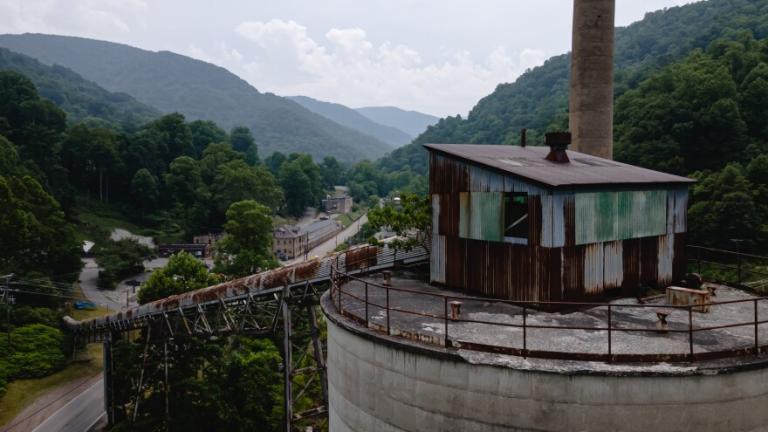
This story by ESI Journalism Fellow Ryan Van Velzer was originally published as part of the Louisville Public Media's “Coal’s Dying Light” series, where it appears with additional photos and resources.
__________
The world’s appetite for coal is diminishing, and the communities that mined it for generations are struggling to adapt. Kentucky’s Republican lawmakers are leveraging the economic turmoil to bolster support for coal, but experts say mining communities would be better off supporting the transition to a sustainable future.
Linda Craiger’s ancestors mined coal in the Appalachian hillsides of Harlan County. Today, Craiger makes her living on the nostalgia left in the coal economy’s wake.
Craiger works as the chief financial officer at the former town school that now serves as a hotel. Guests check-in like students late for class, walk up the stairs past the lockers and swipe a key card to check into a classroom for the night. Many come through for the local tourist attractions: a nearby state park, the Portal 31 underground mine tour and the Kentucky Coal Museum.
“God put the coal here for the mountain people to make a living,” Craiger said, adding that she’d like to keep coal a part of this community for as long as possible.
Generations of Americans relied on the coal mined in Kentucky to forge the steel, heat the furnaces and power the homes of this country. The nation’s reliance on coal, however, is coming to an end, and the communities that once produced it are struggling to adapt.
Nearly 15 million Americans live in energy communities impacted by coal mine and power plant closures, according to an LPM News analysis. Nearly three-quarters of them make less than the national median household income.
Appalachia tops the government’s list of energy communities most impacted by closures. Counties like Harlan are now among the most economically distressed in the country, according to the Appalachian Regional Commission.
Coal is disappearing from the electricity grid. It’s disappearing from the hearts and minds of Americans who are more concerned with the impacts of a warming planet than the fate of fossilized plant matter and those who mined it.
In Kentucky, the winter nights are warmer, the last decade has been wetter, and scientists say natural disasters like last July’s floods in eastern Kentucky will become more frequent. Allowing warming to go unchecked will push people further into poverty, contribute to food insecurity, mass migration and potentially spur global armed conflict across the planet.
State lawmakers are less concerned with climate change than the economic turmoil they say the energy transition is causing in their communities. As a result, many elected officials who represent coal communities are leveraging economic struggles to push for laws supporting the fossil fuel industry at the expense of the climate.
This year, Kentucky’s Republican-dominated Legislature passed legislation making it more difficult to retire coal-fired power plants, and prohibited state investment advisers from considering the long-term ramifications of climate change.
Their rhetoric belies a growing number of Kentuckians who understand the climate science and are looking for economic opportunities amid the energy transition. While many Republicans and Democrats disagree about the role the fossil fuel industry should place in the future of the country, there is bipartisan support for revitalizing the coal communities that helped build this country and can now pioneer a low carbon future.
Advocates argue there’s a moral imperative to help these communities. Federal experts say the revitalization of energy communities is crucial for the country to pivot to a cleaner burning economy at the speed and scale necessary to avoid the worst impacts of warming.
Groups at the local, state and national level are working to get there. That includes Brian Anderson who grew up in West Virginia and is now the executive director of the Interagency Working Group on Coal and Power Plant communities and economic revitalization.
“If we don't involve the energy workers that have powered us for the last 100 years, then I don't think we can get there,” he said.
Politics getting in the way
State Rep. Chris Fugate grew up in the Appalachian hollers of Kentucky. During this year’s legislative session, he told lawmakers how the coal furnace kept his Pappaw’s house so hot when he was young they’d have to crack the windows in the dead of winter.
“Had we had solar panels, Pappaw couldn't have made the sunshine. He couldn’t have made the wind blow, but he’d say ‘son go down there and throw another shovel of coal in the stove,’” he said.
In December, freezing temperatures from Winter Storm Elliott knocked out a portion of Kentucky’s coal and gas power causing rolling blackouts on the coldest day of the year. Kentucky’s largest energy provider, Louisville Gas & Electric and Kentucky Utilities, implemented forced outages for the first time in the company’s history.
Months later, Kentucky’s Republican-dominated Legislature held hearings where several lawmakers including Fugate blamed the outages on the number of coal plants that have retired in recent years.
Republican Rep. Jim Gooch of Providence chairs the House Natural Resources Committee that oversaw the hearings. In his role, he wields power over the energy and environment related bills that move through the state House. He’s also a long-time climate denier who compared climate change to a cult, a talking point used by the right wing think tank American Enterprise Institute.
“Part of the reason that we had the shortages is because of the retirement of coal-fired power plants. Nothing you’re going to say is going to convince us otherwise,” Republican Gooch said.
The truth is more complicated. The rapid onset of freezing temperatures disrupted natural gas supplies for seven power plants in Kentucky and knocked off a significant amount of Tennessee Valley Authority’s coal generation. Wind energy was one of the most reliable sources of electricity during Winter Storm Elliott, and helped supply some power to Kentucky utilities.
Gooch and Fugate are far from the only Kentucky lawmakers who would rather the state continue to rely on coal in spite of the consequences to the climate. There’s Republican Sen. Johnnie Turner of Harlan who doesn’t deny the changes in his community, but says his faith in God reassures him about the ultimate result.
“It ain’t the climate change that’s causing all this, in my opinion, because the world is changing because there’s somebody above us that’s watching us,” he told LPM News.
Sen. Brandon Smith of Hazard, who chairs the Senate Natural Resources Committee, says federal regulations have made coal plants too expensive to operate. Republican Sen. Phillip Wheeler of Pikeville frames climate adaptation as an order imposed by wealthy liberal elites disconnected from the realities of the working class.
“It’s really tough for me to talk about because I’ve represented coal miners in my legal career my entire life. I’ve watched them lose their cars, I’ve watched them lose their homes all because of misguided policies out of Washington,” Wheeler said.
Rather than diversify the state’s energy portfolio following the hearing, Republican Sen. Robby Mills of Henderson pushed forward legislation that makes it more difficult to retire coal-fired power plants. Power companies broadly opposed the law. They said it could force them to invest hundreds of millions of dollars in outdated coal-fired power plants without consideration of the costs.
“It does not make sense from a customer’s perspective to invest hundreds of millions of dollars in those [coal] plants that were built in the ‘70s,” Louisville Gas and Electric Vice President Kent Blake told a House committee in March.
Later that month, the Republican-dominated Kentucky Legislature passed the bill. Democratic Gov. Andy Beshear, who is running for re-election, let it become law without his signature. Earlier this month, Beshear expressed his support for the coal industry, according to WCHS.
"We need the capacity. We need the power on the grid, and so right now we need all forms of energy here in Kentucky. we shouldn't be retiring any of them," Beshear said.
Continue reading on the Louisville Public Media website.






